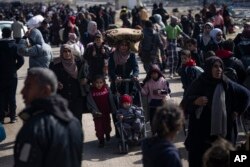A senior United Nations official has warned that civil order could break down in Gaza if escalating hostilities force more and more Palestinians to flee to Rafah, an area crammed with 1.3 million people which prior to Hamas' brutal assault in Israel on October 7 accommodated fewer than 300,000.
"It is packed. There is no space. People are angry. There is no food. There can be a civil disorder, a breakdown of civil order," said Ajith Sunghay, head of the U.N. Human Rights Office for the Occupied Palestinian Territory.
Sunghay, who returned from a mission to Gaza to his post in Amman, Jordan, this week, told journalists by videolink Friday that he met people in Khan Younis who have been under intense Israeli bombardment and heavy fighting. He said they "were frustrated, angry and understandably wary."
"The current situation is catastrophic," he said. "If what is happening in Khan Younis continues the way it is, at the intensity that we are seeing, hundreds of thousands of already displaced people would likely feel they have no other choice but to move again."
People would have only a few places to flee, he added.
"On the one side you have the Mediterranean Sea, on the other, you have the Egyptian border," he said. "If you have people moving there in large numbers from Khan Younis and other places, it is going to be a massive catastrophe."
In Rafah, he said he saw "displaced people who had been ordered by Israeli authorities to leave their homes, with no provision for their accommodation."
He described people living on the street, amid sewage, and in conditions of desperation.
"The people I spoke to fear the extreme violence is spilling into Rafah, which will have catastrophic implications for the more than 1.3 million people already crowded there," he said.
According to Gaza's Hamas-run Ministry of Health, more than 26,000 Palestinians have been killed and 64,400 Palestinians injured since Israel mounted its offensive in Gaza in response to the Hamas-led terror attacks in Israel that killed some 1,200 people and resulted in 240 others taken hostage.
Hospitals and health care facilities have taken a major hit from heavy bombardment by Israel Defense Forces over the past three months. The World Health Organization reports only 14 of the 36 health facilities and hospitals in Gaza are partially functioning.
WHO spokesperson Christian Lindmeier said, "The few functioning hospitals in Gaza are absolutely in dire circumstances with hostilities often preventing the access of patients and supplies."
He said that Nasser hospital in Khan Younis was "now basically besieged … and has no way in and out."
Israel blames the high civilian toll in Gaza on Hamas, which it says uses civilians as human shields and positions fighters, rocket launchers and tunnels in hospitals and dense residential areas.
Israeli Prime Minister Benjamin Netanyahu has repeatedly said Israel will continue the war until Hamas is destroyed.
Human rights official Sunghay said attacks on hospitals, schools, and other places of refuge have repeatedly displaced Palestinians into ever-smaller areas, with ever-decreasing access to the essentials needed to sustain life.
"I am very, very worried. I fear that many more civilians will die. The continued attacks on specially protected facilities, such as hospitals, will kill civilians and there will be a further, massive impact on access to health care, safety, and security in general of Palestinians," he said, adding that the apparent disregard for international law needs to end.
U.N. human rights spokesperson Ravina Shamdasani said her office shines a spotlight on the situation in Gaza but that "much more could be done on the international level. The high commissioner has repeatedly called on all states with influence to exercise that influence to bring this horror to an end."
She said that the U.N. rights office has sent letters and reports to Israeli authorities before they are published for their comments.
"So, our concerns are expressed to them directly … but the office has had no formal response from them," she said.
Sunghay said he was particularly concerned about the potential movement of hundreds of thousands of people into Rafah. He warned a rush of people into Egypt would create a terrible situation.
"It is something that we are dreading and hoping does not happen. But this is exactly my fear." He warned that "all the indications that we have at this point in time is if Rafah is attacked, then we are in uncharted territory."






